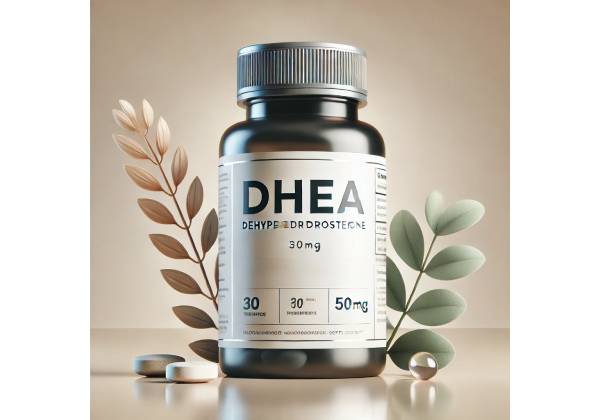What is DHEA?
DHEA, or dehydroepiandrosterone, is a hormone produced by the adrenal glands, gonads, and brain that is one of the most common circulating steroids in the body. DHEA, also known as a “prohormone,” acts as a precursor for other hormones such as testosterone and estrogen. Although DHEA levels peak in early adulthood, they gradually decrease with age, with significant drops occurring by middle age. This decline has been linked to a variety of health problems, including impaired mental and cognitive function, mood swings, and even age-related neurodegenerative diseases.
DHEA is important for mental health because it regulates hormone levels, influences neurotransmitter systems, and modulates the body’s stress response. Researchers discovered that DHEA may have neuroprotective, antidepressant, and anti-anxiety properties. Its ability to improve emotional regulation, reduce anxiety, and boost cognitive function makes it a promising supplement for people suffering from mood disorders, stress, and cognitive decline.
In addition to being a natural hormone produced by the body, DHEA is commonly used as a dietary supplement, particularly for those looking to counteract age-related hormone declines. According to new research, DHEA supplementation may help improve psychiatric and mental health, particularly in people who have low levels of this hormone.
How DHEA’s Structure Contributes to Its Mental Health Benefits
DHEA (dehydroepiandrosterone) is a steroid hormone that comes from cholesterol. It is structurally related to the C19 steroid family, which contains 19 carbon atoms. DHEA’s molecular formula is C19H28O2, and its core structure consists of four fused carbon rings, which are typical of steroid hormones. DHEA is produced in the adrenal cortex through a multi-step process involving enzymes such as CYP11A1 and CYP17A1, which convert cholesterol into pregnenolone, the precursor to DHEA.
DHEA’s unique structure enables it to function as a precursor to both androgens (such as testosterone) and estrogens (such as estradiol) via additional enzymatic conversions in peripheral tissues. This ability to convert into both male and female sex hormones is critical in maintaining hormonal balance, especially as people age and their natural hormone levels decline. The body’s ability to regulate and balance these hormones is critical for both physical and mental health, and imbalances are frequently associated with mood disorders, cognitive decline, and other psychiatric problems.
DHEA is most commonly found in its sulfated form, DHEA-S (dehydroepiandrosterone sulfate), which is more stable and has a longer half-life in the blood. DHEA-S acts as a circulating reservoir that can be converted back to DHEA as needed. This ensures that the hormone is available in sufficient quantities for its various functions, such as brain function, mood regulation, and neuroprotection.
In the brain, DHEA interacts with neurotransmitter systems, specifically gamma-aminobutyric acid (GABA) and glutamate receptors. It also affects the hypothalamic-pituitary-adrenal (HPA) axis, which controls the body’s response to stress. DHEA also has neuroprotective properties because it helps combat oxidative stress and inflammation, two processes that contribute to neurodegenerative diseases and cognitive decline.
DHEA’s biochemical properties, such as its role as a hormone precursor and neuroactive effects, make it an important factor in maintaining mental health, especially in the face of aging and stress.
The Science Behind DHEA’s Benefits for Mental Health
DHEA has sparked growing interest in its potential benefits to mental health, particularly as a mood stabilizer, cognitive enhancer, and neuroprotective agent. DHEA levels decline with age and are associated with a variety of mental health issues, including depression, anxiety, and cognitive impairment, prompting research into its potential as a therapeutic supplement. Here, we look at the mechanisms and effects of DHEA on mental health.
Mood Regulation and Depression
DHEA has been studied for its antidepressant properties, particularly in people who suffer from depression caused by aging, chronic stress, or hormonal imbalance. One of the primary mechanisms by which DHEA improves mood is its ability to modulate neurotransmitter systems in the brain, specifically serotonin, dopamine, and GABA. Serotonin and dopamine are essential for mood regulation, motivation, and emotional stability, whereas GABA relaxes the nervous system and reduces anxiety.
According to research, DHEA supplementation can alleviate depressive symptoms, particularly in mild to moderate depression. A study published in the Archives of General Psychiatry found that people with major depressive disorder who took DHEA supplements had significantly better moods than those who received a placebo. The study found that DHEA may be especially beneficial for people who have treatment-resistant depression or depression caused by hormonal imbalances.
Furthermore, DHEA’s ability to balance the HPA axis, which controls the body’s stress response, contributes to its antidepressant properties. Chronic stress can cause dysregulation of the HPA axis, resulting in elevated cortisol levels that are frequently associated with depression and anxiety. DHEA restores hormonal balance and relieves stress-induced depression symptoms by modulating the HPA axis and lowering cortisol production.
Anxiety and Stress Reduction
DHEA has also demonstrated promise as an anxiolytic (anti-anxiety) agent, owing to its effects on the GABAergic system. GABA is the brain’s primary inhibitory neurotransmitter, responsible for regulating neural activity and preventing overexcitation. DHEA modulates GABA receptors, which helps to promote relaxation and reduce anxiety.
In addition to its interaction with GABA receptors, DHEA’s role in lowering cortisol levels is critical to its anti-anxiety properties. Elevated cortisol, the body’s primary stress hormone, is frequently associated with increased anxiety, irritability, and emotional instability. DHEA reduces the physiological and psychological effects of stress by lowering cortisol levels and promoting a more balanced stress response, making it an important supplement for people suffering from chronic anxiety or stress-related disorders.
Animal studies have demonstrated that DHEA can reduce anxiety-like behavior by influencing the HPA axis and increasing GABAergic neurotransmission. These findings indicate that DHEA supplementation may help alleviate anxiety symptoms in humans, particularly in those suffering from hormonal imbalances or chronic stress.
Cognitive Function and Memory Enhancement
DHEA is a neurosteroid that supports cognitive function, memory, and learning. Cognitive decline, particularly in aging populations, has been linked to low DHEA levels, prompting research into its potential as a cognitive enhancer. DHEA promotes brain health through a variety of mechanisms, including neuroprotective effects, neurogenesis, and neurotransmitter enhancement.
One of the most important ways DHEA promotes cognitive health is by protecting neurons from oxidative stress and inflammation. Oxidative damage to neurons contributes significantly to age-related cognitive decline and neurodegenerative diseases such as Alzheimer’s and Parkinson’s. DHEA’s antioxidant properties help to neutralize free radicals, reducing oxidative damage and promoting neuronal integrity.
DHEA also promotes neurogenesis, or the growth of new neurons, and improves synaptic plasticity, which is required for learning and memory formation. DHEA improves cognitive performance by increasing neurogenesis and synaptic plasticity, especially in tasks involving memory, attention, and executive function.
Several studies have looked into the cognitive benefits of DHEA supplementation. A study in Psychoneuroendocrinology discovered that DHEA improved cognitive function and working memory in older adults. Another study in Clinical Endocrinology found that DHEA supplementation improved verbal fluency, working memory, and executive function in people with cognitive impairments.
Neuroprotection and Mental Resilience
DHEA’s neuroprotective properties make it an effective supplement for maintaining mental health, especially in the face of aging, stress, and neurodegenerative diseases. DHEA protects neurons from oxidative stress, inflammation, and excitotoxicity, all of which contribute to neurodegeneration and cognitive decline. By inhibiting these harmful processes, DHEA promotes long-term brain health and resilience to mental health challenges.
In addition to its antioxidant properties, DHEA affects neurotrophic factors such as brain-derived neurotrophic factor (BDNF), which promotes neuronal growth, repair, and survival. Higher levels of BDNF are associated with improved cognitive function and emotional resilience, especially in people suffering from stress or psychiatric disorders.
DHEA’s ability to regulate the HPA axis and lower cortisol levels contributes to its neuroprotective properties. Chronic stress and high cortisol levels are known to hasten neuronal damage and memory loss. DHEA protects the brain from the negative effects of chronic stress by lowering cortisol and promoting a more balanced stress response. It also supports overall mental resilience.
Maintaining Emotional and Hormonal Balance
As a precursor to both testosterone and estrogen, DHEA is critical for maintaining hormonal balance, especially as people age. Hormonal imbalances are frequently associated with mood disorders, such as depression, anxiety, and irritability. DHEA supplementation can help restore balance by increasing sex hormone levels, which promote mood stability and emotional well-being.
DHEA supplementation, according to research, can improve mood and reduce symptoms of hormonal imbalances, particularly in postmenopausal women and older men. A study published in Menopause discovered that DHEA improved mood, energy levels, and cognitive function in postmenopausal women suffering from hormonal imbalance. This hormonal balance is essential not only for physical health but also for mental and emotional well-being. DHEA reduces mood swings, irritability, and depressive symptoms associated with declining hormone levels by promoting the body’s natural hormone production.
Additionally, DHEA’s effects on the hypothalamic-pituitary-gonadal (HPG) axis aid in the regulation of sex hormone production, which is critical for emotional regulation and overall well-being. This hormonal balance is especially important in older adults, as low testosterone and estrogen levels can lead to mood disorders, fatigue, and cognitive decline. DHEA’s role as a hormone precursor makes it an excellent supplement for supporting mental health at all stages of life, especially during hormonal transitions such as menopause or andropause.
Dose and Administration of DHEA
The appropriate DHEA dosage varies with age, gender, and the individual’s specific health goals. Adults typically take 25 to 50 mg per day for general mental health and well-being. In some cases, higher doses of 100 mg may be prescribed under medical supervision, especially for people with specific psychiatric conditions or hormonal imbalances.
DHEA supplements are available in a variety of formats, including capsules, tablets, and creams. Oral supplementation is the most common method, but topical DHEA creams can also be used to boost hormone levels without disrupting liver metabolism. It is best to begin with a lower dose and gradually increase based on individual needs and responses. Because DHEA is a hormone, it is best to consult with a doctor before beginning supplementation, especially if you have pre-existing medical conditions or are taking other medications.
Possible Risks and Side Effects of DHEA
While DHEA is generally well-tolerated, it can cause side effects, especially at higher doses or with prolonged use. Acne, oily skin, and hair loss are common side effects of androgens, particularly in women. High DHEA doses in men may cause elevated testosterone levels, which can lead to aggression or mood swings.
Individuals with hormone-sensitive conditions, such as prostate cancer, breast cancer, or polycystic ovary syndrome (PCOS), should avoid taking DHEA because it can raise hormone levels. Additionally, individuals taking hormone-affecting medications, such as hormone replacement therapy or corticosteroids, should consult with a healthcare provider before using DHEA, as it may interact with these treatments.











